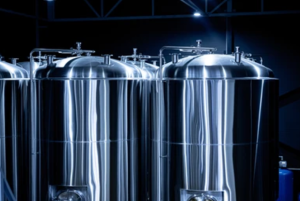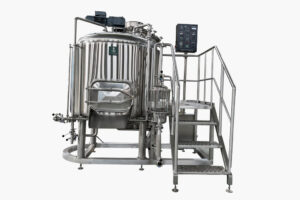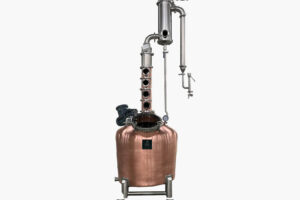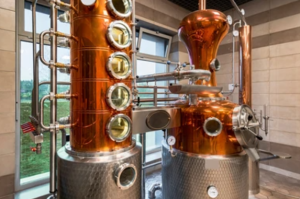COPYRIGHT © 2022 NingBo COFF Machinery Co., ltd. ALL RIGHTS RESERVED
Menu
Categories

The craft spirits market has seen remarkable growth, creating exciting opportunities for microdistilleries. Consumers increasingly seek unique, high-quality spirits, driving the market’s expansion. For instance:
- The number of spirits distilleries grew by 35% annually between 2011 and 2017.
- Craft spirits sales have risen 19% per year since 2015.
- The market value surged from $1.8 billion to $6.1 billion, with a 27.1% annual growth rate.
Starting a microdistillery requires careful planning and a clear understanding of costs. From equipment to licensing, every detail matters. COFF, a leader in microdistillery equipment, offers tailored solutions to help you succeed in this thriving industry.
Key Takeaways
- Learn about the costs to start a microdistillery. These include equipment, licenses, and building expenses. Knowing this helps you plan your budget well.
- Make a strong business plan. Include your goals, audience, and how you will advertise. A good plan helps you succeed.
- Begin getting licenses early. It can take months. Follow all rules from federal, state, and local offices to avoid problems.
- Buy good equipment and ingredients. This helps you make great spirits. High quality improves your brand and makes customers happy.
- Work with distributors and keep marketing your products. These steps help people notice your brand and bring loyal customers.
Understanding the Costs of Starting a Microdistillery

Starting a micro distillery business involves several key expenses. Understanding these costs will help you plan effectively and avoid surprises during your journey.
Equipment Costs (Distillation Equipment, Storage, etc.)
The equipment you choose plays a critical role in your craft distillery setup. Essential items include stills, fermenters, cooling systems, and storage tanks. The cost to start a distillery varies based on the scale of production and the type of equipment. Here’s a breakdown:
| Equipment Type | Price Range | Notes |
|---|---|---|
| Stills | $5,000 – $100,000 | Varies by scale and type |
| Fermenters | $1,000 – $10,000 | Essential for fermentation process |
| Cooling Systems | $2,000 – $20,000 | Critical for vapor condensation |
| Storage Tanks | $1,500 – $15,000 | For aging and storage |
| Accessories | $2,000 – $10,000 | Pumps, hoses, valves, etc. |
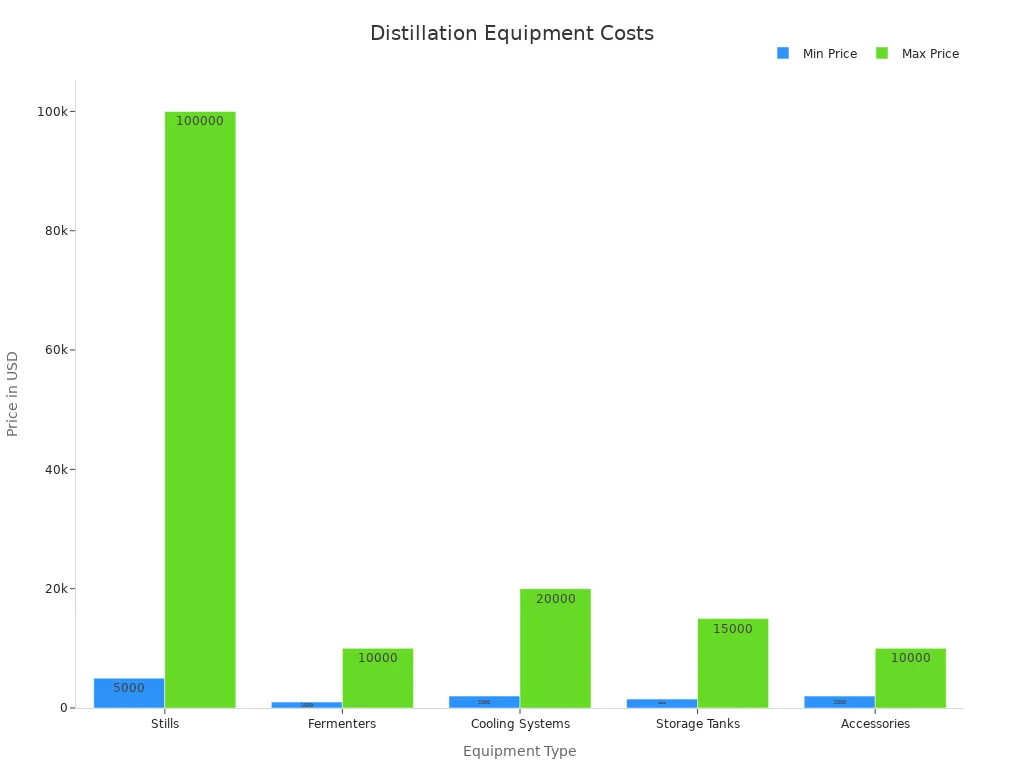
Investing in high-quality equipment ensures efficiency and consistency in alcohol production. COFF offers premium distillation equipment tailored to meet your needs, helping you achieve a seamless production process.
Licensing and Permits (Federal, State, and Local Requirements)
Navigating alcohol production licensing is a crucial step in starting your micro-distillery. Federal and state licensing, along with local permits, ensure your business complies with legal requirements. Here’s an estimate of licensing costs:
| Type of Cost | Estimated Range |
|---|---|
| Licenses & Permits | $5,000 – $50,000 |
| Federal Permit Application | $1,000 |
| State-Level Permits | $2,000 – $10,000 |
| Local Permits and Inspections | $1,000 – $5,000 |
| Employee Training Costs | $500 – $3,000 |
Obtaining these permits can take several months, so start early. COFF’s expertise in the craft distillery industry can guide you through the distillation licensing requirements, ensuring a smooth process.
Facility Costs (Rent, Utilities, Renovations)
Your facility is the backbone of your micro distillery business. Costs include rent, utilities, and renovations to meet production and safety standards. Here’s a snapshot of average utility expenses:
| Utility Type | Average Monthly Cost | Annual Cost |
|---|---|---|
| Electricity | $1,000 | $12,000 |
| Water | $300 | $3,600 |
| Gas | $500 | $6,000 |
| Storage/Warehousing | $1,000 to $5,000 | N/A |
Renovations may add $10,000 to $50,000, depending on the size and condition of the space. A well-designed facility enhances efficiency and safety. COFF’s team can help you optimize your setup for success.
Ingredients and Raw Materials (Grains, Yeast, Water, etc.)
The quality of your ingredients directly impacts the success of your micro distillery business. Essential raw materials include grains, yeast, and water. Each plays a critical role in crafting high-quality spirits.
- Grains: The type of grain you choose—such as barley, corn, rye, or wheat—determines the flavor profile of your spirits. Sourcing high-quality grains ensures consistency and taste. Expect to spend $500 to $5,000 monthly, depending on production volume.
- Yeast: Yeast is vital for fermentation. Specialty strains can enhance flavor complexity. Costs range from $100 to $1,000 per batch.
- Water: Water quality is crucial. Purified or filtered water prevents impurities from affecting the final product. Monthly water costs typically fall between $300 and $1,000.
Partnering with local suppliers can reduce costs and support your community. COFF’s expertise in craft distillery setup ensures your equipment optimizes ingredient usage, minimizing waste and maximizing efficiency.
Branding and Marketing Expenses (Logo, Packaging, Website)
Building a strong brand is essential for standing out in the competitive craft spirits market. Branding and marketing expenses include logo design, packaging, and a professional website.
- Logo Design: A memorable logo establishes your brand identity. Professional design services cost $500 to $5,000.
- Packaging: Eye-catching bottles and labels attract customers. Packaging costs range from $1 to $5 per unit, depending on design complexity.
- Website: A user-friendly website showcases your products and tells your story. Development costs vary from $2,000 to $10,000.
Investing in branding early helps your micro-distillery gain recognition. COFF supports your journey by providing equipment that aligns with your brand’s quality standards.
Miscellaneous Costs (Insurance, Staff, Legal Fees)
Miscellaneous costs often catch new microdistillery owners off guard. These include insurance, staff salaries, and legal fees.
- Insurance: Protect your business with liability and property insurance. Annual premiums range from $2,000 to $10,000.
- Staff Salaries: Hiring skilled staff ensures smooth operations. Monthly payroll costs start at $3,000 and increase with team size.
- Legal Fees: Legal assistance is essential for contracts and compliance. Budget $1,000 to $5,000 annually for legal services.
Planning for these startup costs ensures your micro distillery business operates smoothly. COFF’s team can guide you in managing expenses effectively, helping you focus on growth.
How to Start a Distillery: A Step-by-Step Guide

Researching the Market and Craft Spirits Industry
Before you start a distillery, understanding the market is crucial. The craft beverage industry is growing rapidly, with consumers favoring unique, locally-produced spirits. Over 60% of consumers prefer craft spirits over mass-produced options, showing strong demand. Research trends, customer preferences, and competitors in your area. Identify gaps in the market where your micro distillery business can stand out.
Visit local distilleries to learn about their operations. Attend industry events and join associations to network with experts. This research will help you understand what works and what doesn’t in the craft distillery market. COFF can provide insights into equipment and production trends, ensuring your startup planning and investment considerations align with market needs.
Creating a Business Plan and Budget
A solid business plan is the foundation of your micro distillery business. Start by defining your goals, target audience, and unique selling points. Outline your production process, marketing strategy, and distribution channels. Include a detailed budget that covers startup costs like equipment, ingredients, and licensing.
Break down your expenses into categories such as facility costs, branding, and staff salaries. For example, equipment costs can range from $5,000 to $100,000, depending on your production scale. Effective financial planning ensures sustainability and helps you secure funding. COFF offers high-quality equipment tailored to your budget, making it easier to start a craft distillery without overspending.
Securing Licenses and Permits
Licensing is one of the most critical steps in how to start a distillery. You’ll need federal, state, and local permits to operate legally. The federal permit application alone can cost around $1,000, while state-level permits range from $2,000 to $10,000. Local permits and inspections may add another $1,000 to $5,000.
Start the licensing process early, as it can take several months to complete. Ensure you meet all distillation licensing requirements to avoid delays. COFF’s expertise in the craft distillery industry can guide you through this complex process, helping you navigate licensing and legal requirements with ease.
Choosing a Location and Setting Up the Facility
Selecting the right location is a critical step in setting up a distillery. The facility must meet production needs while complying with zoning laws and safety regulations. Look for a space that offers sufficient room for equipment, storage, and future expansion. Proximity to suppliers and distributors can also reduce transportation costs and improve efficiency.
When evaluating potential locations, consider the following factors:
- Zoning and Permits: Ensure the property complies with local zoning laws for alcohol production.
- Utilities: Check for reliable access to electricity, water, and gas to support operations.
- Accessibility: Choose a location that is easy for suppliers and distributors to reach.
- Space Requirements: Plan for areas dedicated to production, storage, and tasting rooms if applicable.
Renovations may be necessary to meet safety and operational standards. COFF’s team can assist you in optimizing your facility layout to ensure smooth operations and compliance with industry regulations.
Purchasing Equipment and Ingredients
Investing in the right equipment and ingredients is essential for producing high-quality spirits. When deciding how to start a distillery, you’ll need to weigh the benefits of leasing versus purchasing equipment. Leasing can reduce initial startup costs by spreading expenses over time, which improves cash flow. Many leasing agreements also include maintenance services, lowering operational costs. Alternatively, purchasing used or refurbished equipment can save 20% to 50% compared to new equipment, freeing up funds for other areas like marketing.
For ingredients, prioritize quality. High-grade grains, yeast, and water are the foundation of exceptional spirits. Partnering with local suppliers can reduce costs and support your community. COFF offers premium distillation equipment designed to maximize ingredient efficiency, helping you minimize waste and maintain consistency.
Developing Recipes and Testing Products
Creating unique recipes is where your creativity shines. Start by experimenting with different grains, yeast strains, and flavor profiles. Small-batch testing allows you to refine your recipes without wasting resources. Focus on crafting a signature product that sets your micro distillery business apart from competitors.
During the testing phase, gather feedback from industry experts and potential customers. Their insights can help you fine-tune your products before launching. Keep detailed records of each batch, including ingredient ratios and fermentation times, to replicate successful results. COFF’s advanced equipment ensures precision and consistency, giving you the tools to perfect your craft.
Launching Production and Marketing Your Brand
Once your facility is ready and your recipes are perfected, it’s time to launch production and introduce your brand to the market. This stage requires careful planning to ensure a smooth start and effective promotion.
Begin Production with Precision
Start by producing small batches to test your equipment and processes. Monitor every step, from fermentation to distillation, to ensure consistency and quality. Keep detailed records of production times, temperatures, and ingredient ratios. This data will help you refine your methods and maintain high standards.
Invest in reliable equipment to streamline production. COFF offers advanced distillery equipment designed to optimize efficiency and minimize waste. Their solutions ensure your microdistillery operates smoothly from day one.
Build a Strong Brand Identity
Your brand is your story. Create a compelling narrative that highlights your unique approach to craft spirits. Share the inspiration behind your recipes and the care you put into every bottle. Use this story to connect with your audience.
Design eye-catching packaging that reflects your brand’s personality. A well-designed bottle can attract customers and set your product apart on store shelves. Don’t forget to include essential details like alcohol content and ingredients.
Promote Your Microdistillery Effectively
Marketing is key to gaining visibility in the competitive craft spirits market. Start by building an online presence. Develop a professional website that showcases your products, tells your story, and provides contact information. Use social media platforms to engage with potential customers and share updates about your microdistillery.
Collaborate with local businesses to host tasting events or offer your spirits in their establishments. Partnering with restaurants, bars, and liquor stores can help you reach a wider audience. Additionally, consider attending craft spirit festivals to showcase your products and network with industry professionals.
COFF supports your journey by providing equipment that aligns with your brand’s quality and production goals. Their expertise ensures your startup costs are well-spent, helping you focus on growing your business.
Strategies to Manage and Minimize Startup Costs
Starting a microdistillery can be expensive, but smart planning helps you manage costs effectively. Here are some strategies to reduce expenses and keep your business financially healthy.
Leasing vs. Buying Equipment
Leasing equipment can be a practical way to lower initial costs. Instead of spending a large amount upfront, you pay smaller monthly fees. Leasing often includes maintenance services, which reduces repair expenses. This option works well if you’re testing the waters or have limited capital.
Buying equipment, on the other hand, is a long-term investment. It eliminates recurring lease payments and gives you full ownership. If you plan to scale your production, owning your equipment may save money over time. COFF offers high-quality distillation equipment that balances cost and efficiency, whether you choose to lease or buy.
Modern technology also plays a role in cost management. Advanced distillation systems improve production efficiency and reduce raw material waste. This means you can produce more spirits while spending less on ingredients.
Starting Small and Scaling Gradually
Launching your microdistillery on a smaller scale allows you to control costs. Begin with a limited product line and small batches. This approach minimizes waste and helps you refine your processes. As your business grows, you can expand production and introduce new products.
Scaling gradually also reduces the risk of overextending your budget. You can reinvest profits into the business instead of relying on loans. COFF’s customizable equipment solutions make it easy to start small and adapt as your needs change.
Partnering with Local Suppliers for Ingredients
Sourcing ingredients locally offers several benefits. It reduces transportation costs and ensures fresher raw materials. Building relationships with local suppliers can also lead to discounts and long-term partnerships. For example, partnering with nearby farms for grains or fruits supports your community while lowering expenses.
Local collaborations can boost your brand’s appeal. Consumers often value businesses that prioritize sustainability and community engagement. Additionally, energy-efficient practices, like using local resources, can significantly cut operational costs. COFF’s equipment is designed to maximize ingredient efficiency, helping you get the most out of every batch.
Outsourcing Non-Essential Tasks (e.g., Marketing)
Outsourcing non-essential tasks can help you focus on production and reduce operational stress. Marketing is one area where outsourcing can save time and money. Professional agencies specialize in branding, social media management, and advertising. Their expertise ensures your microdistillery gains visibility in the competitive craft spirits market.
Hiring a marketing agency allows you to benefit from their tools and strategies. They can create engaging campaigns, design eye-catching packaging, and manage your online presence. This approach eliminates the need to hire full-time staff for marketing, which reduces payroll expenses. For example, instead of spending $3,000 monthly on an in-house team, you can outsource for $1,500 to $2,000.
Outsourcing also provides flexibility. You can scale services up or down based on your needs. If you’re launching a new product, you can increase marketing efforts temporarily without committing to long-term costs. COFF supports your journey by ensuring your equipment aligns with your brand’s quality, making it easier for marketing professionals to showcase your products effectively.
Leveraging Tax Incentives and Grants
Tax incentives and grants offer cost-saving strategies for new distillers. Governments often provide financial support to encourage small businesses and local production. These programs can significantly reduce startup costs, allowing you to allocate funds to other areas like equipment or facility upgrades.
Several distilleries have benefited from these opportunities. For instance:
- Government-backed funding options have enabled startups like Artisan Spirits Co. to secure up to $50,000 in initial investments, which can cover various startup costs.
Research local and federal programs that support small businesses. Many states offer tax credits for using energy-efficient equipment or sourcing local ingredients. Grants may also be available for businesses that promote sustainability or create jobs in their community.
Applying for these programs requires preparation. You’ll need a detailed business plan and financial records to demonstrate your eligibility. Start early to avoid missing deadlines. COFF’s team can help you optimize your operations, making it easier to qualify for energy-efficient tax credits and other incentives.
Funding Options for a Micro Distillery Business
Starting a distillery requires careful financial planning. Understanding your funding options can help you secure the resources needed to launch and grow your business. Below are some of the most effective ways to finance your micro distillery.
Self-Funding and Bootstrapping
Self-funding, or bootstrapping, involves using your personal savings or resources to start a distillery. This approach gives you full control over your business without the need to repay loans or share ownership. Many successful distilleries began with small-scale operations funded by their founders.
To make self-funding work, start small and focus on essentials like equipment and ingredients. For example, COFF offers customizable distillation equipment that fits various budgets, allowing you to scale your operations gradually. By prioritizing high-quality tools and efficient processes, you can maximize your investment and reduce waste.
Small Business Loans and Lines of Credit
Loans and lines of credit are popular financing options for aspiring distillers. Banks and specialized lenders often provide funding tailored to small businesses in the beverage industry. The Small Business Administration (SBA), for instance, offers loans designed specifically for startups.
When applying for a loan, prepare a detailed business plan that outlines your goals, budget, and expected revenue. This document demonstrates your commitment and helps lenders assess your potential. Additionally, consider working with lenders who understand the unique needs of the craft spirits market. COFF’s team can guide you in selecting equipment that aligns with your financial plan, ensuring you make the most of your loan.
| Funding Type | Description |
|---|---|
| Grants | Non-repayable funds for startups |
| Loans | Borrowed money to be repaid |
| Crowdfunding | Raising small amounts from many |
| Angel Investors | Wealthy individuals investing |
Crowdfunding Platforms
Crowdfunding has become a powerful tool for financing micro distilleries. Platforms like Kickstarter and Indiegogo allow you to raise small amounts of money from a large number of people. In 2014 alone, over $3 billion was raised through rewards-based crowdfunding campaigns.
To succeed, create a compelling campaign that highlights your story, vision, and unique products. Campaigns that reach 50% of their goal within the first 15 days are more likely to succeed. Offer attractive rewards, such as exclusive bottles or tasting experiences, to encourage contributions. COFF’s premium equipment ensures your products meet the high standards expected by your supporters, helping you build trust and loyalty.
Tip: Research available grants and prepare your application early. A strong business plan and proper documentation can increase your chances of securing funding.
Attracting Investors or Business Partners
Securing investors or business partners can provide the financial boost you need to start a distillery. Investors bring capital, while partners can contribute expertise or resources. To attract them, you must present a compelling case for your business.
Start by creating a detailed business plan. Include your vision, market research, and financial projections. Highlight the growing demand for craft spirits and explain how your distillery will stand out. Investors want to see a clear path to profitability. Use visuals like charts or graphs to make your plan more engaging.
Networking is another effective strategy. Attend industry events, trade shows, or local business meetups. These gatherings connect you with potential investors who share your passion for craft spirits. You can also join online forums or social media groups focused on the beverage industry.
Consider offering equity or profit-sharing to attract investors. This approach gives them a stake in your distillery’s success. Be transparent about the risks and rewards involved. A well-structured agreement builds trust and ensures a smooth partnership.
COFF can enhance your pitch by providing high-quality equipment tailored to your needs. Highlighting your partnership with a trusted brand like COFF shows investors that you are committed to quality and efficiency.
Exploring Government Grants for Small Businesses
Government grants can significantly reduce the cost of starting a distillery. These funds do not require repayment, making them an attractive option for new entrepreneurs. Many grants focus on supporting small businesses, promoting sustainability, or boosting local economies.
Research available grants at the federal, state, and local levels. Websites like Grants.gov or your state’s economic development office are excellent starting points. Look for programs tailored to the beverage industry or small-scale manufacturing.
Prepare a strong application to increase your chances of approval. Include a detailed business plan, financial projections, and a clear explanation of how the grant will benefit your distillery. Highlight any community benefits, such as job creation or partnerships with local suppliers.
Some grants prioritize businesses that use energy-efficient equipment or sustainable practices. COFF’s advanced distillation systems can help you meet these criteria. Their energy-efficient designs not only save costs but also align with grant requirements.
Applying for grants takes time and effort, but the financial support can be a game-changer. Start early and stay organized to maximize your chances of success.
Learning from Successful Microdistilleries
Case Study 1: Hudson Valley Distillers (New York)
Hudson Valley Distillers exemplifies how micro-distilleries can thrive by diversifying revenue streams and focusing on customer experience. Located in New York, this distillery has built a loyal customer base by offering artisanal spirits and hosting engaging events. Their profit margins range between 40-60%, showcasing the financial potential of high-quality craft spirits. Additionally, related revenue streams, such as tours and tastings, contribute up to 25% of their total income.
The distillery also benefits from a 15% annual growth rate in customer visits. This growth highlights the importance of creating a welcoming environment and offering unique experiences. By prioritizing quality and customer engagement, Hudson Valley Distillers has set a benchmark for success in the craft spirits industry.
Case Study 2: Balcones Distilling (Texas)
Balcones Distilling, based in Texas, has gained recognition for its innovative approach to whiskey production. Known for using non-traditional grains and bold flavors, this distillery has carved out a niche in the competitive market. Their focus on distillation efficiency ensures high-quality spirits while minimizing waste.
Balcones also excels in branding and marketing. Their strong social media presence and participation in industry events have helped them achieve significant market penetration. By combining innovation with effective marketing strategies, Balcones Distilling demonstrates how creativity can drive success in the craft spirits sector.
Key Lessons from Industry Leaders
Successful micro-distilleries share common practices that contribute to their growth and profitability. These include operational efficiency, effective marketing, and sustainable practices. The table below summarizes key performance indicators (KPIs) that can guide your distillery’s success:
| KPI Metric | Description |
|---|---|
| Production Yield Rate | Measures the percentage of raw materials that result in finished products. |
| Cost Per Bottle | Calculates the total cost involved in producing each bottle of spirit. |
| Customer Acquisition Cost | Assesses the cost associated with acquiring a new customer. |
| Sales Growth Rate | Evaluates the increase in sales over a specific period. |
| Inventory Turnover Ratio | Indicates how quickly inventory is sold and replaced during a given period. |
| Distillation Efficiency | Measures the effectiveness of the distillation process in yielding high-quality spirits. |
| Return On Investment | Calculates the profitability of investments made in the business. |
| Market Penetration Rate | Assesses the percentage of the target market that is purchasing the product. |
| Customer Retention Rate | Measures the percentage of customers who continue to purchase over time. |
Industry leaders emphasize the importance of storytelling in marketing. Sharing your brand’s journey and values can create a strong connection with customers. Additionally, adopting sustainable practices, such as local sourcing and waste reduction, enhances your brand image and attracts eco-conscious consumers. COFF supports these efforts by providing energy-efficient equipment that aligns with your sustainability goals.
Tip: Regular staff training and quality control ensure consistent production and customer satisfaction. Engaging employees in risk management processes also strengthens your operations.
Common Challenges in Starting a Micro-Distillery
Starting a micro-distillery comes with unique challenges that require careful planning and strategic solutions. Understanding these obstacles can help you navigate the journey more effectively.
Navigating Complex Licensing Processes
Licensing is one of the most significant hurdles for new micro-distilleries. Each state has its own regulations, making compliance a daunting task. You must secure federal, state, and local permits before starting operations. The process often involves extensive paperwork, inspections, and fees. For example, the cost to start a micro distillery includes licensing fees that can range from $5,000 to $50,000, depending on your location.
Compliance with alcohol production laws is non-negotiable. Missing a step in the licensing process can delay your startup or lead to legal penalties. To simplify this process, start early and consult experts who understand the requirements. COFF’s team can guide you through these complexities, ensuring your distillery meets all compliance standards.
Managing Cash Flow During the Early Stages
Cash flow management is critical during the initial stages of your microdistillery. Startup costs, including equipment, ingredients, and facility expenses, can quickly add up. Financial risks, such as unexpected repairs or delays in licensing, can jeopardize your investment.
To maintain healthy cash flow, prioritize essential costs and avoid unnecessary expenses. Leasing equipment instead of buying can reduce upfront costs. Additionally, starting with small batches allows you to control production costs while testing the market. COFF offers flexible equipment solutions that help you manage costs effectively, ensuring your resources are allocated wisely.
Building Brand Awareness in a Competitive Market
The craft spirits market is highly competitive, making it essential to differentiate your brand. Without a solid marketing strategy, even the best products may struggle to gain traction. Effective marketing helps you reach your target audience and build a loyal customer base.
Focus on what sets your micro-distillery apart. Many successful brands highlight unique features, such as organic ingredients or innovative flavors. Engaging with customers through social media can also enhance visibility. Consumers increasingly seek locally-sourced spirits, presenting an opportunity to connect with your community.
Invest in professional branding, including logo design and packaging, to make a strong first impression. Hosting events or partnering with local businesses can further boost your presence. COFF supports your branding efforts by providing high-quality equipment that reflects your commitment to excellence.
Why Choose COFF for Your Microdistillery Journey
Overview of COFF’s Expertise in Distillery Equipment
COFF stands out as a trusted partner for microdistillery startups due to its unmatched expertise in distillation equipment. With over 15 years of engineering experience, COFF designs equipment that meets industry certifications like ASME and AS1210. This ensures reliability and adherence to the highest quality standards. Their modular systems are specifically tailored for startups, allowing you to expand production as your business grows.
Energy efficiency is another hallmark of COFF’s equipment. By reducing operational costs, their designs help you maintain profitability while minimizing waste. The use of durable materials ensures long-term reliability, making COFF’s equipment a smart investment for your distillery. From the initial engagement to installation, COFF provides expert guidance to ensure your operations run smoothly from day one.
How COFF Supports Entrepreneurs with Custom Solutions
Starting a distillery comes with unique challenges, and COFF excels at providing tailored solutions to address them. Their team works closely with you to understand your specific goals and production needs. Whether you’re balancing quality with scalability or optimizing ingredient usage, COFF offers equipment designed to meet your requirements.
COFF’s support doesn’t end with equipment delivery. Their engineers assist with installation, ensuring efficient operation from the start. Ongoing technical support is available to minimize downtime and resolve any issues quickly. For example, a small craft distillery successfully scaled production using COFF’s hybrid still while maintaining consistent flavor profiles. This level of customization and support makes COFF an invaluable partner for your microdistillery journey.
Testimonials from Successful Microdistillery Owners
Many microdistillery owners credit COFF for their success. One owner shared how COFF’s modular systems allowed them to start small and scale gradually, saving costs while growing their business. Another highlighted the energy-efficient designs, which reduced operational expenses and improved profitability.
A distillery in the U.S. praised COFF’s technical support, stating that the team’s guidance during installation ensured a seamless start to production. Their ability to address challenges quickly helped the business maintain smooth operations. These testimonials reflect COFF’s commitment to helping entrepreneurs succeed in the competitive craft spirits market.
Tips for Long-Term Success in the Micro Distillery Business
Building Strong Relationships with Distributors
Distributors play a vital role in expanding your distillery’s reach. Building strong partnerships with them ensures your products are available in more locations, increasing sales and brand visibility. Start by identifying distributors who specialize in craft spirits. These partners understand the unique appeal of small-batch products and can connect you with the right audience.
Maintain open communication with your distributors. Share your production schedule and marketing plans to align efforts. Offering incentives, such as exclusive product releases, can strengthen these relationships. Hosting events or tastings for distributors and their clients also fosters collaboration. A well-connected distributor network helps your distillery thrive in a competitive market.
Innovating with Unique Flavors and Products
Innovation keeps your distillery relevant and exciting. Experimenting with unique flavors or limited-edition products can attract new customers and retain loyal ones. Use local ingredients to create spirits that reflect your region’s identity. For example, incorporating seasonal fruits or herbs adds a distinctive touch to your offerings.
Small-batch testing allows you to refine recipes without significant waste. Gather feedback from tastings to understand customer preferences. Highlight your innovative approach in marketing campaigns to stand out. COFF’s advanced equipment supports your creativity by ensuring precision and consistency in every batch. This flexibility allows you to explore new ideas confidently.
Staying Compliant with Industry Regulations
Compliance is essential for long-term success in the distillery business. Adhering to federal, state, and local regulations protects your operations from fines or shutdowns. For example, obtaining permits like the federal distilled spirits permit ($1,000) and state-level licenses ($2,000–$10,000) ensures legal operation. Employee training for compliance, costing $500–$3,000, enhances your team’s understanding of regulatory requirements.
Non-compliance damages credibility and consumer trust. Proper documentation and regular audits help maintain compliance. Streamlining operations with COFF’s energy-efficient equipment can also align with sustainability regulations, potentially qualifying you for tax incentives. Staying compliant not only secures your business but also builds a trustworthy brand image.
Investing in Continuous Marketing Efforts
Marketing is not a one-time effort. For your distillery to thrive, you need to invest in continuous marketing strategies that keep your brand visible and relevant. Consistent marketing builds trust, attracts new customers, and strengthens loyalty among existing ones.
One effective approach is community engagement. Hosting events, such as tastings or workshops, allows you to connect with your audience on a personal level. These interactions create lasting impressions and encourage repeat business. Social media is another powerful tool. Platforms like Instagram and Facebook let you showcase your distillery’s story, products, and behind-the-scenes processes. Regular posts and engaging content can significantly boost your visibility.
Offering unique experiences, such as VIP tours or limited-edition releases, can also set your distillery apart. These exclusive opportunities not only attract attention but also create a sense of value for your customers. The table below highlights how these strategies impact customer retention and revenue growth:
| Strategy | Impact on Customer Retention | Impact on Revenue Growth |
|---|---|---|
| Community Engagement | Over 30% increase | N/A |
| Social Media Integration | N/A | Up to 50% increase |
| Unique Experiences (e.g., VIP) | N/A | Estimated 20% boost |
To maximize the benefits of these efforts, consistency is key. Regularly update your website, engage with followers, and introduce fresh ideas to keep your audience interested. COFF supports your marketing goals by providing high-quality equipment that reflects your commitment to excellence. A well-crafted product speaks volumes and makes your marketing efforts more impactful.
By prioritizing continuous marketing, you ensure your distillery remains competitive in the ever-growing craft spirits market.
Starting a microdistillery requires careful planning and a clear understanding of costs. From equipment and licensing to branding and marketing, every step plays a vital role in your success. Begin by creating a detailed business plan that outlines your goals, budget, and strategies. Explore funding options like loans, grants, or partnerships to secure the resources you need.
COFF stands ready to support your journey with high-quality equipment and expert guidance. Their tailored solutions ensure your microdistillery operates efficiently, helping you focus on crafting exceptional spirits. Take the first step today and turn your vision into reality.
FAQ
What is the minimum budget to start a microdistillery?
Starting a microdistillery typically requires a minimum budget of $50,000 to $100,000. This includes equipment, licensing, ingredients, and facility costs. COFF offers cost-effective, high-quality equipment to help you optimize your budget and start your journey efficiently.
How long does it take to get the necessary licenses?
The licensing process can take 3 to 12 months, depending on your location and compliance with federal, state, and local regulations. Starting early and consulting experts like COFF can help you navigate this process smoothly.
Can I lease equipment instead of buying it?
Yes, leasing equipment is a great option to reduce upfront costs. It allows you to spread expenses over time and often includes maintenance services. COFF provides flexible equipment solutions tailored to your needs, whether you choose to lease or buy.
How can I stand out in the competitive craft spirits market?
Focus on unique recipes, high-quality ingredients, and strong branding. Use local resources and tell your story to connect with customers. COFF’s advanced equipment ensures consistent quality, helping your products stand out in a crowded market.
Does COFF offer support after purchasing equipment?
Absolutely! COFF provides ongoing technical support, from installation to maintenance. Their team ensures your equipment operates efficiently, helping you focus on crafting exceptional spirits and growing your business.

